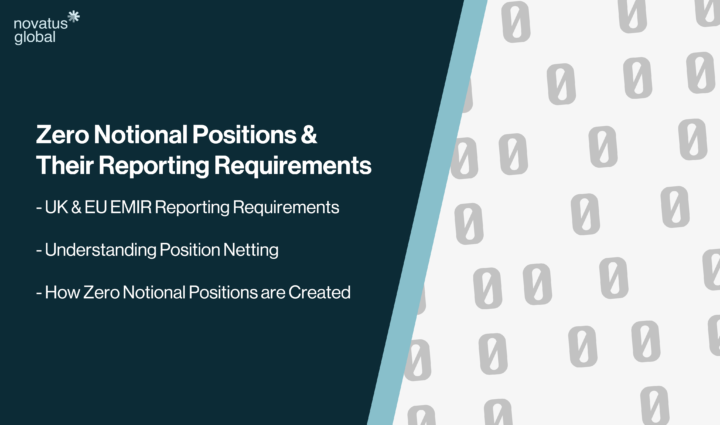
Zero Notional Positions and Their Reporting Requirements
Notional Value and Zero Notional Positions Explained
The term notional value refers to the underlying value used to calculate the contractual obligations of a derivative trade. A zero notional position occurs when the value (or the exposure) of a contract derivative is zero. This can happen when the position has been fully settled, closed or offset.
Reporting zero notional positions is a subject of much debate and instructions can vary depending on the regulatory environment. Under the European Market Infrastructure Regulation (EMIR), there are certain regulatory reporting requirements associated with zero notional positions. The UK EMIR is presently aligned with the EU EMIR on this issue, although this may be subject to change in the future as the FCA and Bank of England consider changes to the reporting requirements for OTC derivatives.

Understanding Position Netting and Its Impact on Notional Value
Netting is the process of consolidating multiple trades to better manage market exposure and help mitigate risk. Consolidating the trades helps to streamline and simplify transaction reporting.
There are two main kinds of netting for these situations:
- Real-Time Netting – this approach nets positions immediately upon execution, reducing exposure. This is particularly effective in situations with multiple parties or multiple trades and works to offset any exposures involved. Real-time netting minimises rolling risk and enhances transaction efficiency.
- End-of-Day (EOD) Netting – all trades are consolidated at the close of each trading day. This simplifies trade management and reporting by simplifying numerous trades into a single, netted position. This also helps to provide a clearer view of the overall exposure.
Netting directly impacts the notional value by offsetting multiple positions in the same instrument against each other. For example, if two derivative trades hold equal but opposite exposures, netting would mean they effectively cancel each other out – resulting in a zero notional position. While this offset effectively cancels the exposure, the individual transactions involved remain important for reporting and regulatory compliance.
How Is a Zero Notional Position Created?
A zero notional position occurs when offsetting trades cancel each other out, resulting in no net exposure for either trade. Here is an example of how this can work in practice (FX Derivatives – OTC Market):
- A trader sells £5m GBP/USD, creating a short position in GBP and a long position in USD
- The trader then buys £4m USD/GBP, which partially offsets the initial position
- Finally, the trader buys an additional £1m USD/GBP, which completes the offset
By netting these trades, the trader’s overall positions balance out. They have effectively bought and sold £5m GBP/USD total across three trades. This results in a zero notional position by eliminating the net exposure. Netting plays a critical role in the efficient management of certain positions and mitigating risk. The sequence of each trade that results in a zero notional position is required to be recorded to comply with regulatory standards and ensure transparency.
Where & Why Are Zero Notional Positions Reportable
The reporting of zero notable positions informs regulators which positions are open or closed, which helps to improve market transparency. EMIR mandates reporting of all derivatives trades to authorised trade repositories (TRs), including zero notional positions. This is stipulated as follows under Paragraph 261 of the Guidelines for Reporting under EMIR, published on 23rd of October, 2023:
“In the case where a position is netted (the notional becomes zero), there are two possible ways to proceed:
- The position can be terminated. If the position is reopened, it should be reported with a new UTI.
- Counterparties can maintain the open position and report a zero contract value on a daily basis. If new trades are then incorporated into this position, the notional, and other relevant fields, should be updated accordingly.”
Reporting zero notional positions has some key obligations stipulated by EMIR:
-
-
- Lifecycle Event Reporting: EMIR requires lifecycle reporting which includes every stage of the lifecycle of a derivative trade. This means that firms must report zero notional trades and the sequence of events that led to this outcome. This data is considered relevant and important for market transparency.
- Daily Valuations: counterparties must submit daily reports of all open trades under EMIR reporting obligations. If zero notional trades were removed from these obligations it may create gaps in explaining what happened to the trade, so they are still considered necessary for comprehensive market oversight.
- Counterparty Identification: all trades that result in zero notional positions must be reported including the Legal Entity Identifier (LEI) for each party. This means that no trade is unreported and every legal entity participating is recorded.
-
What are the Benefits of Zero Notional Reporting?
There are several key benefits to zero notional trade reporting:
-
-
- Market Transparency: the main goal of most market regulators is to improve market transparency which requires reporting all trades, regardless of the outcome. Achieving full transparency makes the financial markets safer for all participants as it provides a complete picture of market exposure and contributing entities.
- Mitigating Risk: the purpose of covering lifecycle events is to provide comprehensive trade monitoring to reduce systemic market risk. Assessing the lifetime events of a trade helps regulators assess emerging concentrations of risk and follow the impact of derivative trades.
- Data Integrity: if zero notional positions were removed from reporting, there would be gaps in the data for market analysis. Reporting them ensures that Trade Repositories maintain consistent records, reducing the chance of unreliable data.
-
Ensuring Regulatory Compliance with Novatus En:ACT
Novatus En:ACT is the market-leading, purpose-built SaaS platform for streamlining all of your G20 regulatory reporting requirements. Utilising cutting-edge technology En:ACT helps to ensure the timeliness, accuracy and completeness of your transaction reporting, helping to avoid penalties and remediation programmes associated with transaction reporting errors.
Contact us today, and one of our experts will be happy to walk you through the benefits that En:ACT can provide for your firm from implementation.











